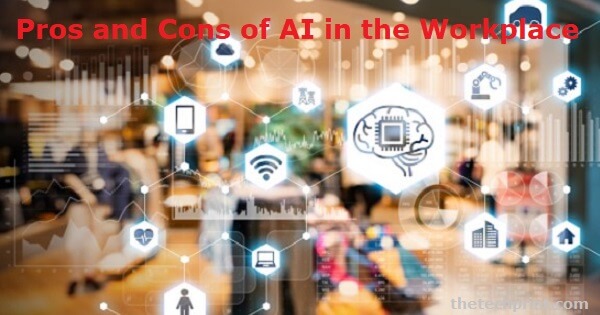Artificial intelligence (AI) is rapidly becoming one of the most transformative technologies of our time, with the potential to revolutionize how we work and live. Businesses across industries are starting to harness AI to improve their operations, better serve their customers, and gain a competitive edge. But how would you feel to have a robot in your workplace? The majority of people believe robots can further their careers better than humans. A global study in 2021, discovered that over three-fourths of individuals feel “stuck” in their job and would accept help from a robot if offered. But, there are obvious pros and cons of AI in the workplace that shouldn't go unnoticed.
Given that the business world is on the verge of adopting robotics let's explore the advantages of artificial intelligence in the workplace.
The primary benefit of AI in the workplace is increased productivity. Automating repetitive tasks allows employees to focus on higher-level tasks that require critical thinking and creativity. For example, a bank teller can spend less time counting cash and more time engaging with customers.
One of the major pros of AI in the workplace is improved customer service. With chatbots and virtual assistants, businesses can provide 24/7 assistance to their customers without needing human interaction. These tools can handle simple tasks such as answering FAQs and providing product recommendations. An example is chatbots used by e-commerce companies such as Amazon and eBay.
AI can also help businesses make better decisions by providing real-time insights based on data analysis. For instance, a retail store can use AI to track customer purchase history and trends to stock the right products at the right time. Or, a hospital can use AI to predict patient demand and staff accordingly.
Businesses can also save money with AI by automating tasks that would otherwise require human labor. For example, a company can use chatbots to handle simple inquiries instead of hiring additional customer service reps. This not only reduces labor costs but also boosts efficiency.
Companies can monitor employee activity, identify potential safety hazards, and create virtual work environments that allow employees to test out new ideas and procedures safely. The AI-enabled technology can also be used to develop training programs that teach employees how to work with new technologies safely.
Now let's explore some potential cons of AI in the workplace.
One of the most frequently cited concerns about AI is that it will lead to mass job losses. As AI systems become more sophisticated, they will be able to handle an increasing number of tasks currently performed by human workers. This could result in large-scale unemployment and a decline in wages.
Another concern about AI is that it could be used to violate ethical norms. For example, if an employer were to use AI to monitor employee performance, this could make employees feel like they are being constantly watched and evaluated.
Additionally, AI could be used to automatically identify and target high-performing employees for specific job roles, which could create a feeling of unfairness or discrimination among employees. Additionally, AI-powered chatbots or virtual assistants could be used to communicate with customers or clients on behalf of the company, which could lead to privacy concerns.
AI systems can also pose a security risk if they are not properly designed and secured. Hackers could use AI to access sensitive data or launch attacks on systems.
The potential for artificial intelligence at the workplace to raise security risks is significant. With the rapid adoption of AI technologies in businesses, understanding and addressing these risks is becoming more urgent.
There are many ways in which AI can pose a security risk. For example, automated systems may be vulnerable to hacking or spoofing, and data used to train AI models could be stolen or leaked. AI systems may also introduce new risks by automating tasks previously done manually, such as decision-making or monitoring.
There is no doubt that artificial intelligence (AI) is revolutionizing the workplace. By automating tasks and providing employees with predictive data, AI is making work easier and more efficient. However, some potential privacy concerns come along as cons of AI in the workplace.
One of the most common ways that AI is used in the workplace is through employee monitoring. This can take many forms, from tracking workers’ locations via GPS to monitoring their computer usage and biometric data. While this monitoring can help improve productivity and safety, it can also invade employees’ privacy.
Conclusion- Pros and Cons of AI in the Workplace
In conclusion, there are pros and cons to using AI in the workplace. However, it is clear that the potential benefits far outweigh the potential risks. With proper implementation and management, AI can help businesses to improve efficiency, productivity, and decision-making. It can also help to create new jobs and business opportunities. On the other hand, if not managed properly, AI can pose a risk to jobs and privacy. Therefore, businesses must carefully consider how they implement AI in their workplace.

By incorporating artificial intelligence into their workforce, businesses can have more productive employees. When a machine takes care of the menial and routine tasks that an organization faces, its people are free to focus on being creative, jumping to solve complex problems, and working on projects with real significance. A great example of this is chatbots.
Businesses commonly use AI to help manage staff algorithms and candidate selection processes. This machine-learning process can be extremely helpful when deciding who to hire for a certain role.
We will need to retrain future generations of workers and help those in the workforce move into new roles that take advantage of their strengths.
AI and machine learning skills are predicted to grow rapidly in the next five years, with a 71% expansion in jobs that require these abilities.